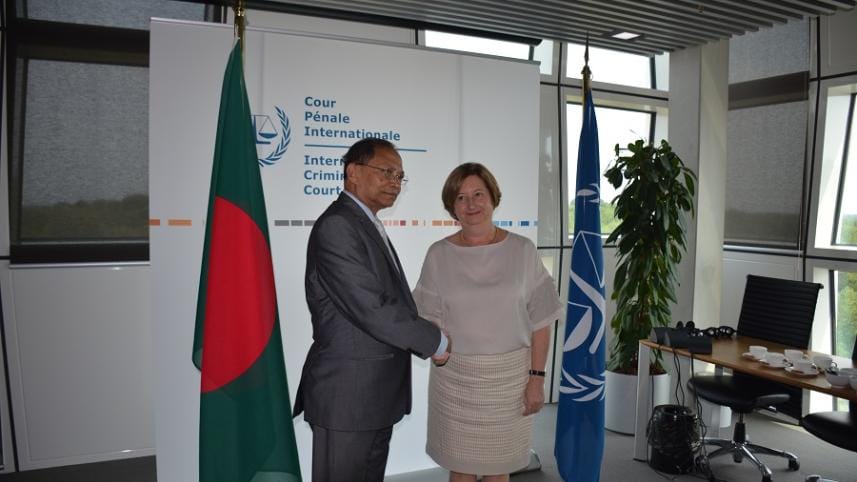ICC satisfied with Bangladesh’s war crimes trial

International Criminal Court (ICC) President Justice Silvia Alejandra Fernández de Gurmendi expressed her satisfaction over the proceedings of war crimes trials in Bangladesh, according to a press release of Supreme Court.
“The experience of Bangladesh in holding war crimes trial will play an important role in development of overall judicial system in the national level,” she said.
The ICC president came up with the remarks at a meeting with Chief Justice Surendra Kumar Sinha in Hague of Netherlands on June 20, the press release said today.
The intergovernmental organisation’s Deputy Prosecutor James Stewart was present at the meeting.
Chief Justice SK Sinha, who led a six-member delegation of Bangladesh in the Hague, informed the ICC that the war criminals had attempted to obstruct their trial proceedings through appointing international lobbyists in exchange for money.
“The war criminals had made the attempt when the first international crimes tribunal was constituted with three Supreme Court judges for holding the trial. Later on, another tribunal was formed in order to tackle the situation and then the war crimes trial got speed,” he said.
He said it was a matter of bad luck that the war criminals had been engaged in destroying the evidence and history of war crimes committed during the Liberation War of Bangladesh in 1971.
The then newspapers had played a very important role in holding the trial of the war criminals though the newspapers were under the ownership and control of the Pakistanis and their like-minded people, he said, adding that some epoch-making books also played important role in holding the war crimes trial.
Chief Justice SK Sinha said there is a village in Bangladesh where all males were killed during the Liberation War in 1971 and later on the village was named as Bidhoba Palli (village of widows).
The widows have made statements before the international crimes tribunal during the proceedings of the war crimes trials, he said.
He said the international crimes tribunals were formed under the International Crimes (Tribunal) Act, 1973 and later on rules were framed under this law for holding the trial in assistance with some international laws including the Role Statute.
After assuming the state powers in 2008, the incumbent government has initiated the process of holding the trial of the crimes against humanity and the war crimes committed in 1971 and constituted the international crimes tribunals, the chief justice said.
“It is matter of happiness that though our prosecutors, judges and others concerned had no education and training about the war crimes trial, they have achieved vast knowledge and competence through going through the Rome Statute,” he said, adding that the accused war criminals have got maximum opportunity to defend themselves during the trials.
Terming Bangladesh a secular state, Justice SK Sinha said he, himself, is a good example of secularism as he has been in the office of the chief justice though he is a man of other religion than Islam in Bangladesh where 90 percent people are Muslim.
ICC President Fernández, who assumed office in 2015, also expressed her satisfaction for Bangladesh’s support to the Rome Statute and appreciated Chief Justice SK Sinha for his speech.



 For all latest news, follow The Daily Star's Google News channel.
For all latest news, follow The Daily Star's Google News channel.
Comments